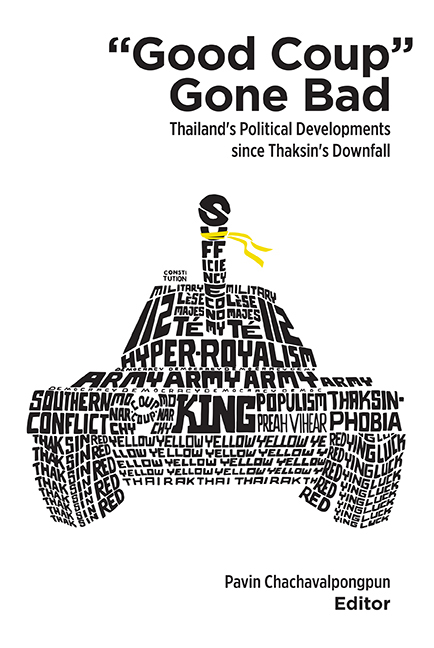Book contents
- Frontmatter
- Contents
- List of Tables and Figures
- Foreword
- Contributors
- Abbreviations
- Section I The 2006 Military Coup: Impact on the Thai Political Landscape
- Section II Defending the Old Political Consensus: The Military and the Monarchy
- Section III New Political Discourses and the Emergence of Yellows and Reds
- 6 “Vote No!”: The PAD's Decline from Powerful Movement to Political Sect?
- 7 The Red Shirts: From Anti-Coup Protesters to Social Mass Movement
- 8 Is Peasant Politics in Thailand Civil?
- Section IV Crises of Legitimacy
- Index
- Plate Section
6 - “Vote No!”: The PAD's Decline from Powerful Movement to Political Sect?
from Section III - New Political Discourses and the Emergence of Yellows and Reds
Published online by Cambridge University Press: 21 October 2015
- Frontmatter
- Contents
- List of Tables and Figures
- Foreword
- Contributors
- Abbreviations
- Section I The 2006 Military Coup: Impact on the Thai Political Landscape
- Section II Defending the Old Political Consensus: The Military and the Monarchy
- Section III New Political Discourses and the Emergence of Yellows and Reds
- 6 “Vote No!”: The PAD's Decline from Powerful Movement to Political Sect?
- 7 The Red Shirts: From Anti-Coup Protesters to Social Mass Movement
- 8 Is Peasant Politics in Thailand Civil?
- Section IV Crises of Legitimacy
- Index
- Plate Section
Summary
Since the elections of 6 January 2001 that brought Thaksin Shinawatra into power, conflicting assessments of his actions and goals have shaped much of Thai politics. The establishment's (aphichon) key concern with Thaksin (later complemented by supporting issues such as corruption, doubtful loyalty to the monarchy, and human rights violations) was put forward as early as October 2001 when a most respected aphichon member, former Prime Minister Anand Panyarachun warned, “Danger caused by people with dictatorial inclinations has not disappeared from Thailand”. One decade later, after the electoral triumph of Thaksin's youngest sister, Yingluck Shinawatra, The Nation reported a very similar statement, again by Anand. He had “called on all Thais to fight against any move to bring the government, court and legislature under the control of one person or group” since this might lead to “tyranny”. Both statements aimed at awakening the public to the assumed (not without reason) dangers posed by Thaksin, and spurring concomitant counter-measures.
Seen from this angle, the political struggles of the years 2001 to 2011 were largely about averting a potential “tyrant” Thaksin. In order to destroy its arch-enemy, various components of the establishment made use of political, military, and judicial (but significantly not electoral) opportunities that opened up at certain times. Measures taken included the protests by the People's Alliance for Democracy (PAD) in 2006 and 2008, the election boycott by the Democrat and Chart Thai Parties in April 2006, the military coup in September 2006 (which came after a royal decree had announced fresh elections for October 2006), the dissolution of two Thaksin parties (Thai Rak Thai in 2007 and People's Power in 2008), the drafting of the supposedly anti-Thaksin constitution of 2007, the sentencing of Thaksin to two years in prison without probation in October 2008, Democrat Abhisit Vejjajiva becoming prime minister in December 2008, the court-ordered confiscation of the bigger part of Thaksin's assets in February 2010, and the appointment of seventy-three senators in April 2011.
- Type
- Chapter
- Information
- Good Coup Gone BadThailand's Political Development since Thaksin's Downfall, pp. 141 - 169Publisher: ISEAS–Yusof Ishak InstitutePrint publication year: 2014

